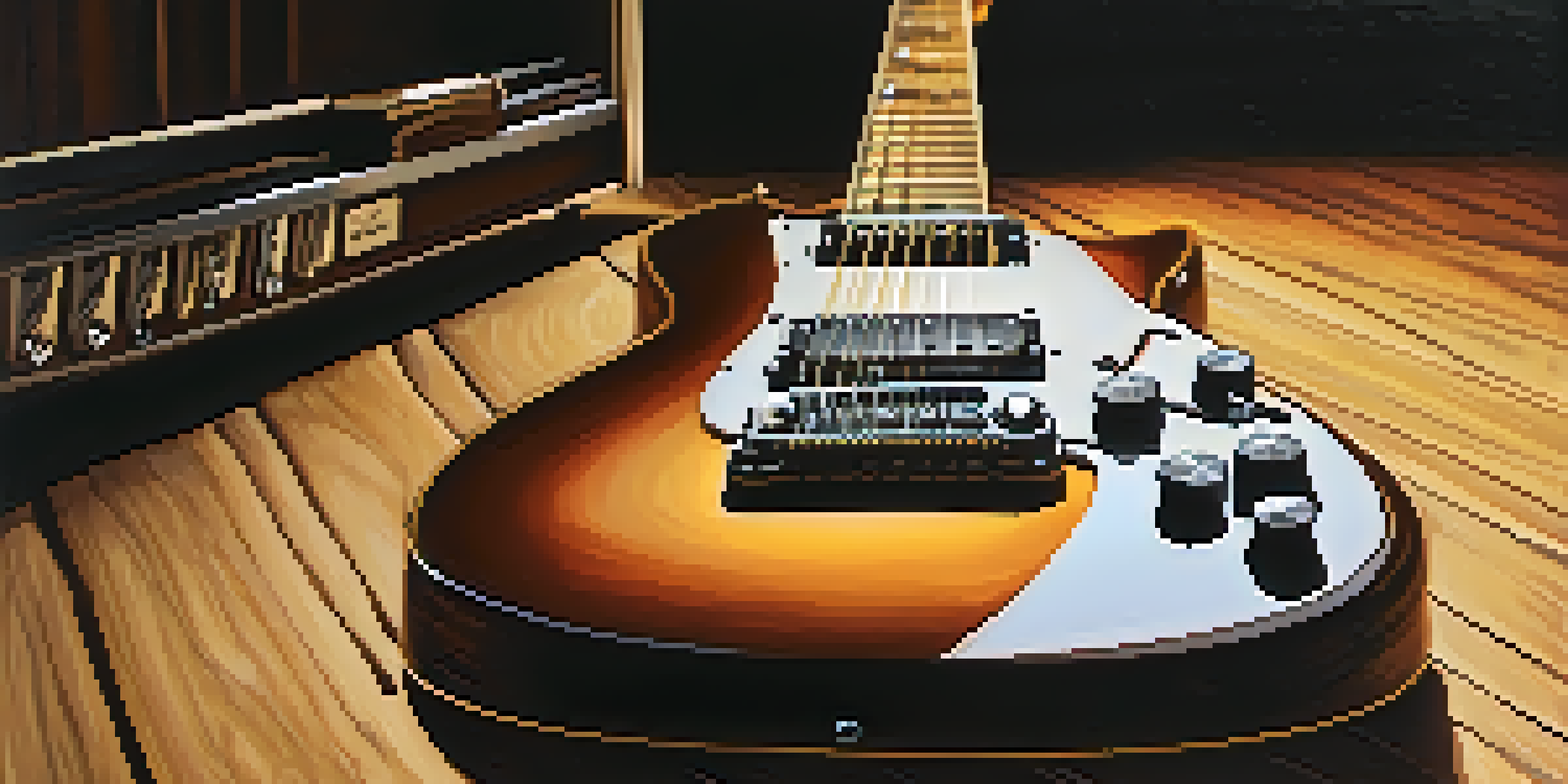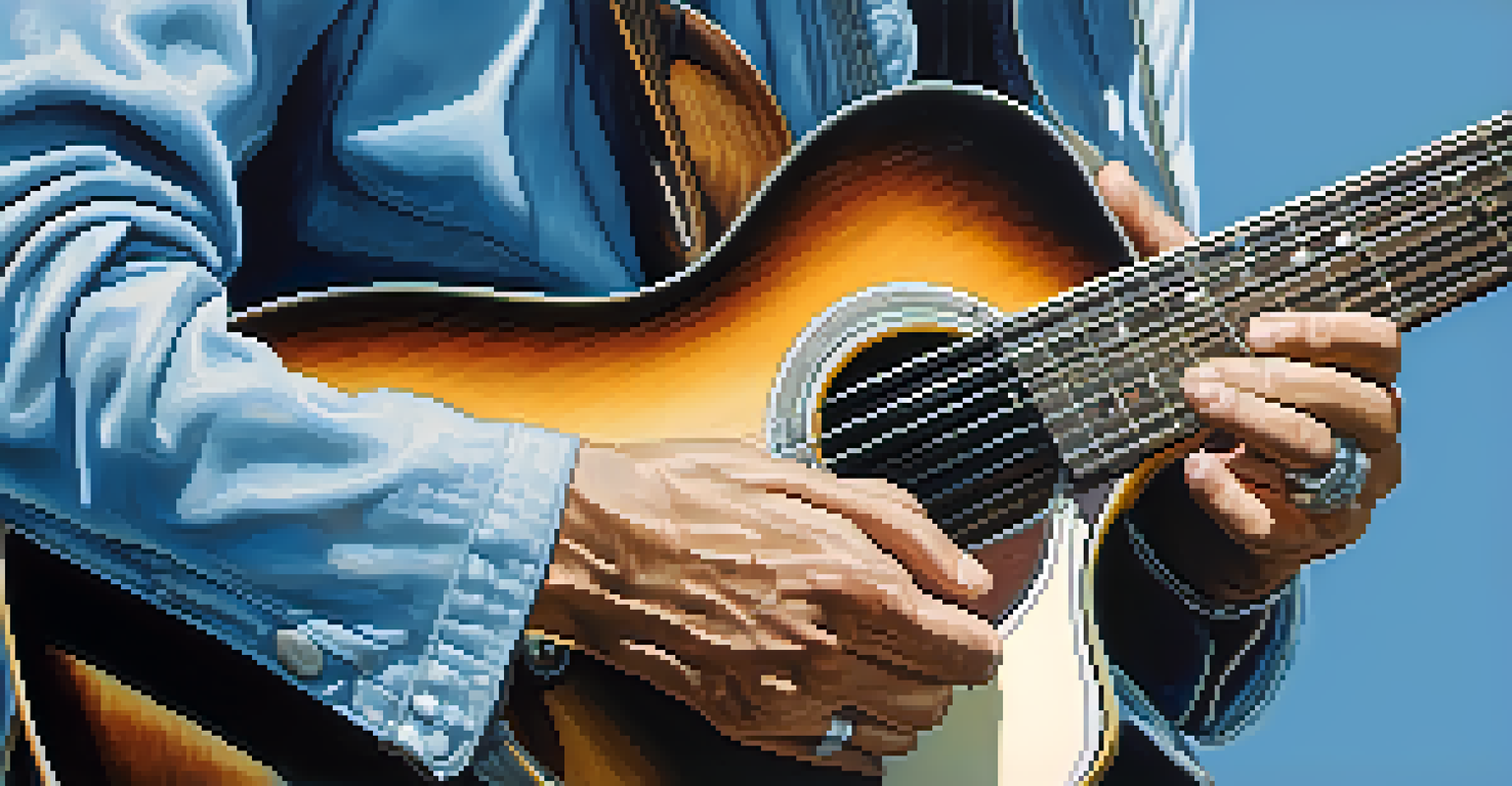Eric Clapton: The Guitar God Who Shaped Blues Rock Forever

Early Life and Musical Beginnings of Eric Clapton
Eric Clapton was born in 1945 in Ripley, England, and his early life was marked by a love for music. Growing up, he was heavily influenced by the blues, which resonated with his experiences and emotions. His fascination began with artists like B.B. King and Muddy Waters, who laid the groundwork for his future musical pursuits.
The blues is the roots, the rest is the fruits.
As a teenager, Clapton picked up the guitar, quickly realizing that it was his true calling. His persistence paid off as he honed his skills, becoming known for his unique sound and passionate playing. This drive led him to join various bands, each experience shaping his musical identity.
By the early 1960s, Clapton had joined The Yardbirds, marking the beginning of his journey into the spotlight. His time with the band not only showcased his talent but also introduced blues rock to a wider audience. This pivotal moment set the stage for his legendary career.
Clapton's Role in the Formation of Cream
In 1966, Clapton co-founded Cream, a supergroup that blended blues, rock, and psychedelic music. With Jack Bruce on bass and Ginger Baker on drums, Cream quickly gained popularity for their explosive performances and innovative sound. Their unique blend of genres was groundbreaking, paving the way for future rock musicians.

Cream's hit songs like 'Sunshine of Your Love' and 'White Room' showcased Clapton's extraordinary guitar work, which became a hallmark of his style. The band's improvisational performances highlighted his ability to connect with audiences, making each show a unique experience. Clapton's electrifying solos became the stuff of legend.
Clapton's Early Blues Influences
Eric Clapton's love for blues music from artists like B.B. King and Muddy Waters shaped his musical identity and passion for guitar.
Despite their success, Cream disbanded in 1968, but their influence was undeniable. They left a lasting legacy that would inspire countless artists in the years to come. Clapton's time with the band solidified his status as a guitar virtuoso and a crucial figure in rock history.
Solo Career: A Journey of Reinvention
Following Cream's breakup, Clapton embarked on a solo career that showcased his versatility and depth as an artist. His debut album, 'Eric Clapton,' released in 1970, featured a mix of original songs and covers that reflected his blues roots. This album marked a significant turning point, allowing him to explore different musical styles.
Music is the shorthand of emotion.
Throughout the 1970s and 1980s, Clapton released a series of successful albums, including '461 Ocean Boulevard' and 'Slowhand.' These records not only highlighted his guitar prowess but also his songwriting abilities. Hits like 'Layla' and 'Wonderful Tonight' became staples in the rock genre, resonating with fans worldwide.
Clapton's willingness to reinvent himself kept his music fresh and relevant. He continued to experiment with various genres, incorporating elements of reggae, pop, and even country into his work. This adaptability not only broadened his appeal but also solidified his legacy as a true musical innovator.
The Influence of Blues on Clapton's Music
Blues music has always been at the heart of Clapton's artistry, shaping his style and defining his sound. His deep respect for legendary blues artists is evident in his guitar playing and songwriting. Clapton often cites musicians like Robert Johnson and Albert King as pivotal influences on his musical journey.
Clapton's ability to channel the emotion and essence of blues has created timeless classics that resonate with listeners. Songs like 'Crossroads' and 'I Shot the Sheriff' pay homage to the genre while showcasing his signature guitar techniques. His heartfelt interpretations breathe new life into traditional blues themes.
Innovative Collaborations and Impact
Clapton's collaborations with artists across genres have enriched his sound and highlighted his versatility as a musician.
By embracing blues and making it accessible to a broader audience, Clapton has played a crucial role in the genre's evolution. His contributions have inspired countless musicians to explore their own roots, ensuring that the spirit of blues continues to thrive. Clapton's music serves as a bridge between generations, connecting the past with the present.
Clapton's Impact on Guitar Playing and Techniques
Eric Clapton's guitar playing is characterized by its emotional depth and technical brilliance. He is known for his expressive use of bends, vibrato, and a unique fingerpicking style that sets him apart from his contemporaries. These techniques have influenced countless guitarists, making him a revered figure in the music community.
His innovative approach to tone and sound has also left a lasting mark on the industry. Clapton's use of the Gibson Les Paul and Fender Stratocaster guitars has become iconic, with many aspiring musicians emulating his style. His ability to extract rich, soulful tones from his instruments continues to inspire new generations.
Clapton's contributions to guitar playing extend beyond his own music; he has also shared his knowledge through various means. His instructional videos and live performances often showcase his techniques, encouraging others to explore their own creativity. This willingness to mentor and inspire has solidified his status as a guitar god.
Collaborations and Musical Partnerships
Throughout his career, Clapton has collaborated with a diverse array of artists, further enriching his musical journey. From working with legends like Bob Dylan and George Harrison to contemporary stars like B.B. King, each partnership has brought new dimensions to his sound. These collaborations highlight his versatility and ability to adapt to different styles.
One of his most notable collaborations was with B.B. King on the album 'Riding with the King,' which beautifully blended their distinctive styles. The chemistry between the two guitarists was palpable, creating a timeless collection of songs that resonated deeply with fans. This partnership serves as a testament to Clapton's respect for the blues tradition.
Legacy as a Guitar Virtuoso
With over five decades of influence, Clapton's innovative guitar techniques and genre-blending music have left a lasting mark on the music industry.
Clapton's willingness to collaborate demonstrates his belief in the power of music to transcend boundaries. These partnerships not only showcase his talent but also his commitment to fostering connections within the music community. By working with others, Clapton has continued to evolve as an artist while honoring his roots.
Legacy and Lasting Influence on Music
Eric Clapton's legacy is etched in the annals of music history, with a career that spans over five decades. He has received numerous awards, including multiple Grammy Awards and induction into the Rock and Roll Hall of Fame three times. These accolades reflect not only his talent but also his profound impact on the music industry.
Beyond awards and accolades, Clapton's influence is felt in the countless musicians he has inspired. His ability to blend genres and innovate has paved the way for new artists to explore their own sound. Many guitarists cite Clapton as a primary influence, emphasizing his role in shaping modern rock and blues.

Clapton's music continues to resonate with audiences today, proving that great art transcends time. His dedication to his craft and passion for music have solidified his status as a true guitar god. As new generations discover his work, Clapton's legacy will undoubtedly endure, inspiring future musicians to carry the torch.